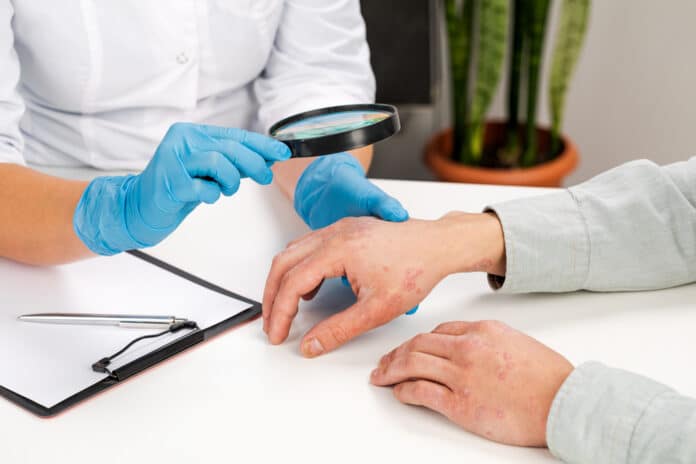
Psoriasis is a chronic, immune skin condition that affects approximately 2-3% of people. It is characterized by red, itchy patches of skin, usually on the elbows, knees, scalp, and back.
Despite its prevalence, there are still many misconceptions about psoriasis that can create confusion and misunderstanding. Here are five of the most common myths about psoriasis.
Myth #1: Psoriasis is Just Dry Skin
Many people think of psoriasis as merely a dry skin condition. However, it is much more than that. Psoriasis involves complex interactions with the immune system, causing accelerated skin cell turnover.
Cell turnover refers to the process by which old skin cells are shed off, and new cells rise to the surface. For most people, this cycle takes about a month, but for people with psoriasis, it can take as little as three to seven days. This leads to the accumulation of thickened, scaly patches of skin.
Myth #2: Psoriasis Is Contagious
When you see someone with a rash or other visible skin condition, you might initially be inclined to keep your distance so that you don’t get it too.
Psoriasis is not contagious. It cannot be spread from person to person through physical contact or other means. You do not need to avoid touching someone with psoriasis or their belongings.
Myth #3: Psoriasis Is Caused by Poor Hygiene
Some people believe that psoriasis is caused by poor hygiene or a lack of a good skincare routine.
While there are a few lifestyle factors that can contribute to psoriasis flare-ups, such as stress, smoking, and alcohol consumption, these don’t cause psoriasis itself.
And psoriasis isn’t cured with lotions and creams in the same way that dry skin or dermatitis may be.
Myth #4: Psoriasis Is Only Cosmetic
Although psoriasis can certainly affect your cosmetic appearance, it goes much deeper than that. The physical symptoms of psoriasis can cause pain, itching, and burning, as well as discomfort due to scaling and flaking.
Many people living with psoriasis develop psoriatic arthritis, a form of inflammatory arthritis that can lead to joint damage and disability.
In addition to the physical effects, people with psoriasis may experience depression, anxiety, social isolation, and other emotional challenges.
Myth #5: Psoriasis Is Not Treatable
Although there is currently no cure for psoriasis, many treatments are available to help manage the symptoms and improve quality of life.
Treatments may include topical creams or ointments, light therapy (phototherapy), medications, and lifestyle modifications.
If you have symptoms resembling psoriasis, you must talk to your doctor or dermatologist to determine the cause and get appropriate treatment. While psoriasis is a life-long condition, there are many ways to manage it and live a full life.



















